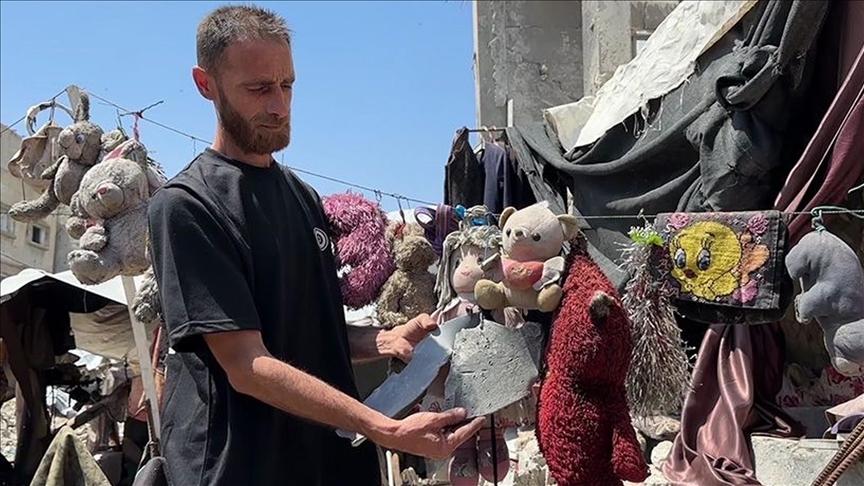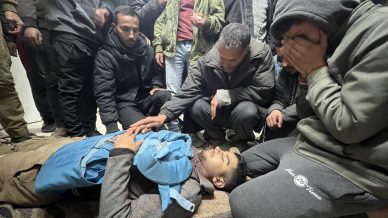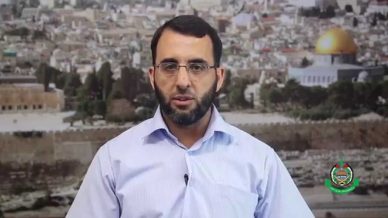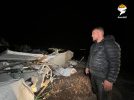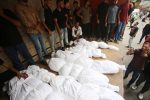GAZA, (PIC)
Amidst the ruins of a neighborhood turned to ashes in the Al-Bureij refugee camp in the central Gaza Strip, Firas Weshah lives a complex tragedy that words cannot describe. On November 2, 2023, Weshah lost 18 members of his family in a horrific massacre committed by the Israeli army, from which only two children and an injured wife survived.
All that remains for Firas of the memories of those who passed are a few tattered toys and scattered clothes that he salvaged from under the rubble. Among the destroyed stones, Firas erected a small tent that barely protects him from the scorching sun or the sting of the cold, and near its entrance, he stretched a clothesline on which he hung the remains of the beloved belongings of the departed.
A dusty soccer ball, colorful drawings, a blue water bottle, and dolls stained with dirt and blood dance with the wind as if they were the souls of the little ones who left suddenly.
Firas is a father of five children, three of whom were killed and two survived; one was born after the massacre, as his wife was still pregnant at the time, and the other was pulled alive from under the rubble. He not only lost his children but also his mother, brothers, and their children, leaving scars in his heart that time cannot erase.
Firas tells Anadolu, while holding one of his children’s toys with a trembling hand and a tired voice: “I used to work day and night to provide them with a modest life, a warm home, and small dreams, but suddenly, everything ended … for no fault, for no reason.”
Torn memories
Firas points out that since recovering from his injury, he has been working to search under the rubble for what remains of the memories of his family and neighbors, and what reminds him of the beautiful days of his children.
He continues: “We were subjected to heavy bombardment in which all members of my family were martyred and my neighborhood was completely destroyed. We lived very difficult days, and now after treatment, I live on top of the rubble of my house, and all the time I am looking for what remains of their memories.”
While he speaks, his eyes wander around the place as if searching for an absent shadow. His fingers wipe the dust off a small child’s shirt, hugging it once and smelling it again, trying to steal a warm moment from under the coldness of death.
He adds in a choked voice: “I retrieved the toys of my children and the toys of my brothers’ children, just to find solace in them … because I miss them so much.”
An open graveyard
Around Firas’s tent, the scene of devastation extends endlessly, with houses without roofs, torn walls, roads strewn with rubble, and under every stone, perhaps there are remnants of a life that once pulsed with laughter and clamor.
Today, Firas lives with his injured wife and two children, in addition to his niece who lost her parents and siblings, trying to keep what remains of his family alive, amidst the suffocating famine that is sweeping Gaza, which has turned neighborhoods into ghost towns of the hungry.
On the firewood, Firas cooks what he can find of food, after a difficult journey to obtain it in light of the severe siege suffered by the Palestinians in the Gaza Strip.
Since March 2, Israel has closed the crossings of the Gaza Strip to the entry of food, relief, and medical aid, causing an unprecedented deterioration in the humanitarian situation for the Palestinians, according to government, human rights, and international reports.
The Palestinians of Gaza, numbering 2.4 million people, depend entirely on this aid, after the ongoing Israeli genocide for 19 months turned them into poor people, according to World Bank data.
A cry to the world
In a message to the world, Firas says: “Enough silence, look at us, we are besieged, we lack our simplest rights, no food, not even toys for the children. Stand with us to protect what remains of our children.”
He adds sadly: “I wish safety and security for the children of Gaza and their mothers, as the women of Gaza have suffered the most under these harsh conditions.”
Since March 18, Israel has intensified its crimes of genocide in Gaza by launching violent raids on a wide scale, mostly targeting civilians in homes and tents sheltering displaced people.
At the beginning of March, the first phase of an agreement for a ceasefire and exchange of prisoners between the Hamas Movement and Israel ended, which began on January 19, 2025, with Egyptian and Qatari mediation and American support.
While Hamas adhered to the terms of the first phase, the head of the occupation government, Benjamin Netanyahu, who is wanted by international justice, renounced the start of the second phase in response to the extremists in his ruling coalition, according to Hebrew media.
Since October 7, 2023, Israel, with absolute American support, has been committing crimes of genocide in Gaza, which have left about 170,000 Palestinian martyrs and wounded, most of them children and women, and more than 11,000 missing.

